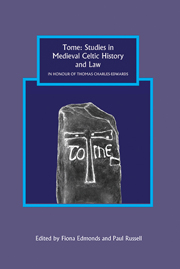Book contents
- Frontmatter
- Contents
- List of Illustrations
- Preface
- List of Contributors
- Abbreviations
- 1 Cloud-Cuckoo Land? Some Christian Symbols from Post-Roman Britain
- 2 Columbanus's Monasticism and the Sources of his Inspiration: From Basil to the Master?
- 3 Early Irish Priests within their Own Localities
- 4 Political Organisation in Dál Riata
- 5 Irish Boundary Ferta, their Physical Manifestation and Historical Context
- 6 Asser's Parochia of Exeter
- 7 Viking-Age Sculpture in North-West Wales: Wealth, Power, Patronage and the Christian Landscape
- 8 Iona v. Kells: Succession, Jurisdiction and Politics in the Columban Familia in the Later Tenth Century
- 9 A Twelfth-Century Indulgence Granted by an Irish Bishop at Bath Priory
- 10 Gerald of Wales, Gildas, and the Descriptio Kambriae
- 11 Patrick's Reasons for Leaving Britain
- 12 Learning Law in Medieval Ireland
- 13 Holding Court: Judicial Presidency in Brittany, Wales and Northern Iberia in the Early Middle Ages
- 14 The Iorwerth Triads
- 15 The Recovery of Stolen Property: Notes on Legal Procedure in Gaelic Ireland, Scotland and the Isle of Man
- 16 Contentious Kinship: The Penumbra of Established Kinship in Medieval Irish Law
- 17 Marriage by Purchase in Early Irish Law
- 18 Kingship Made Real? Power and the Public World in Longes Mac nUislenn
- 19 Mongán's Metamorphosis: Compert Mongáin ocus Serc Duibe Lacha do Mongán, a Later Mongán Tale
- Bibliography of the Writings of Thomas Charles-Edwards Maredudd ap Huw
- Index
- Tabula Gratulatoria
15 - The Recovery of Stolen Property: Notes on Legal Procedure in Gaelic Ireland, Scotland and the Isle of Man
Published online by Cambridge University Press: 05 October 2013
- Frontmatter
- Contents
- List of Illustrations
- Preface
- List of Contributors
- Abbreviations
- 1 Cloud-Cuckoo Land? Some Christian Symbols from Post-Roman Britain
- 2 Columbanus's Monasticism and the Sources of his Inspiration: From Basil to the Master?
- 3 Early Irish Priests within their Own Localities
- 4 Political Organisation in Dál Riata
- 5 Irish Boundary Ferta, their Physical Manifestation and Historical Context
- 6 Asser's Parochia of Exeter
- 7 Viking-Age Sculpture in North-West Wales: Wealth, Power, Patronage and the Christian Landscape
- 8 Iona v. Kells: Succession, Jurisdiction and Politics in the Columban Familia in the Later Tenth Century
- 9 A Twelfth-Century Indulgence Granted by an Irish Bishop at Bath Priory
- 10 Gerald of Wales, Gildas, and the Descriptio Kambriae
- 11 Patrick's Reasons for Leaving Britain
- 12 Learning Law in Medieval Ireland
- 13 Holding Court: Judicial Presidency in Brittany, Wales and Northern Iberia in the Early Middle Ages
- 14 The Iorwerth Triads
- 15 The Recovery of Stolen Property: Notes on Legal Procedure in Gaelic Ireland, Scotland and the Isle of Man
- 16 Contentious Kinship: The Penumbra of Established Kinship in Medieval Irish Law
- 17 Marriage by Purchase in Early Irish Law
- 18 Kingship Made Real? Power and the Public World in Longes Mac nUislenn
- 19 Mongán's Metamorphosis: Compert Mongáin ocus Serc Duibe Lacha do Mongán, a Later Mongán Tale
- Bibliography of the Writings of Thomas Charles-Edwards Maredudd ap Huw
- Index
- Tabula Gratulatoria
Summary
A good deal of general information on the law relating to theft is to be found in the surviving Old Irish legal material from the seventh to the ninth centuries AD. The main law text on this topic is Bretha im Gatta ‘judgements about thefts’, though it is incomplete, owing to the loss of a page in the manuscript. Material on theft is also present in a number of other Old Irish law texts, such as Críth Gablach, Bechbretha and Bretha Cairdi.
The earlier material in Irish contains little specific information on the legal mechanisms for the recovery of stolen property. However, this aspect of the law of theft is touched on in more detail in a Treatise by Giolla na Naomh Mac Aodhagáin, chief judge of Connacht (ardollamh Connacht), whose death in 1309 is recorded in the annals. One passage which deals with the tracking of stolen cattle has been edited and translated by W. N. Osborough in an article entitled ‘The Irish Custom of Tracts’, published in the Irish Jurist. The general principle is that if the cattle can be tracked – presumably by the owner accompanied by witnesses – to a particular place, the inhabitants of that place must pay for the theft (íoc na gaide), unless they can show that the track continues in another direction, i.e. ‘to put the track of the theft from them’ (lorg na gaide do chur díobh).
- Type
- Chapter
- Information
- Tome: Studies in Medieval Celtic History and Law in Honour of Thomas Charles-Edwards , pp. 165 - 172Publisher: Boydell & BrewerPrint publication year: 2011



